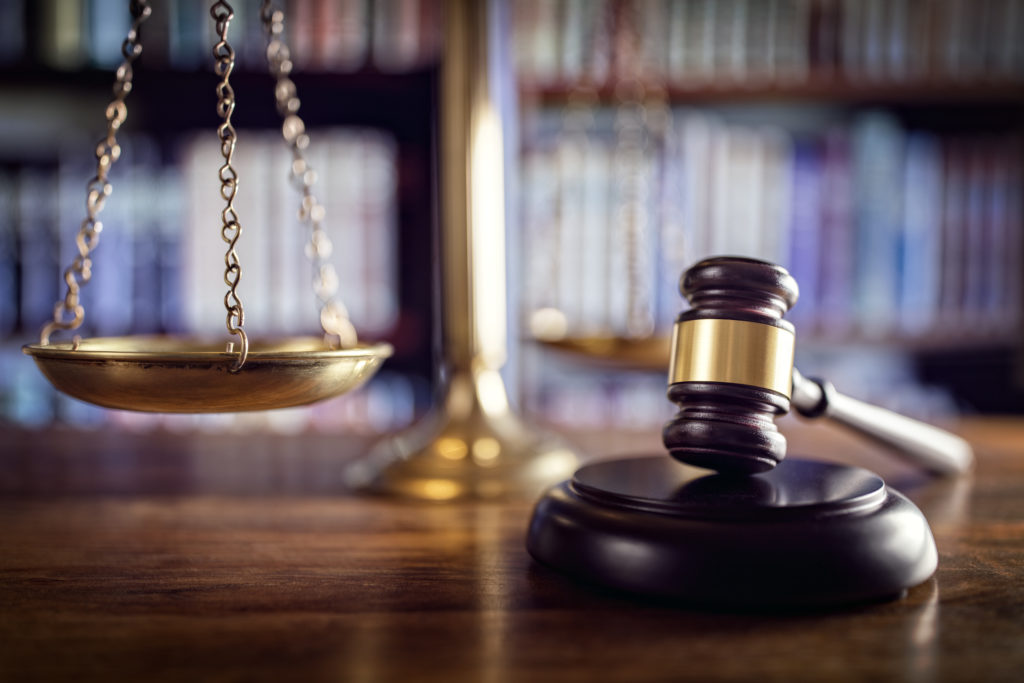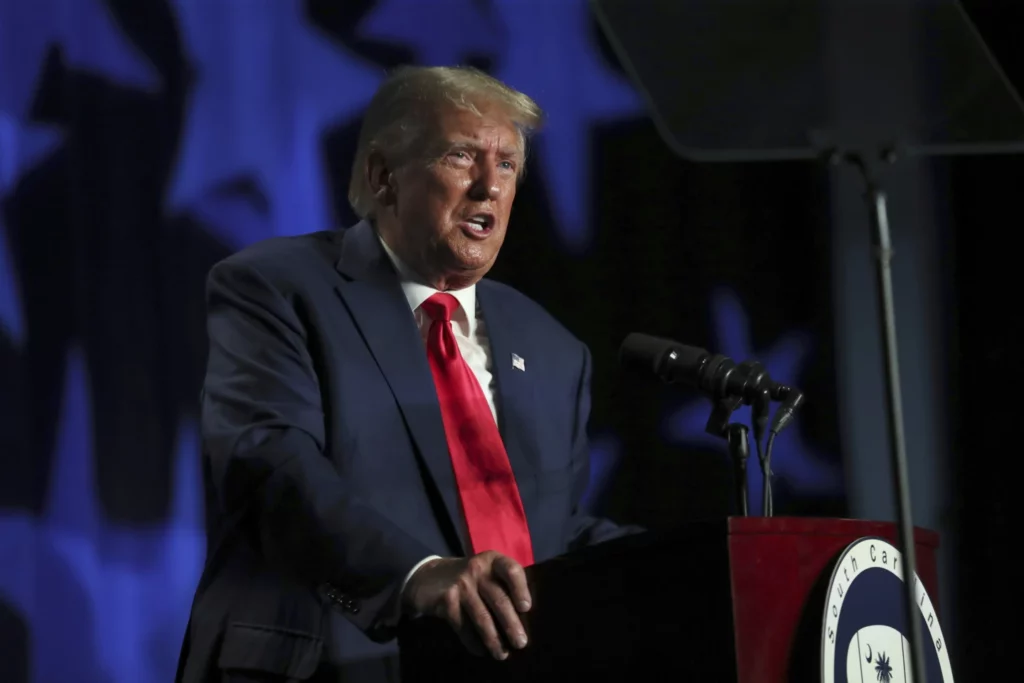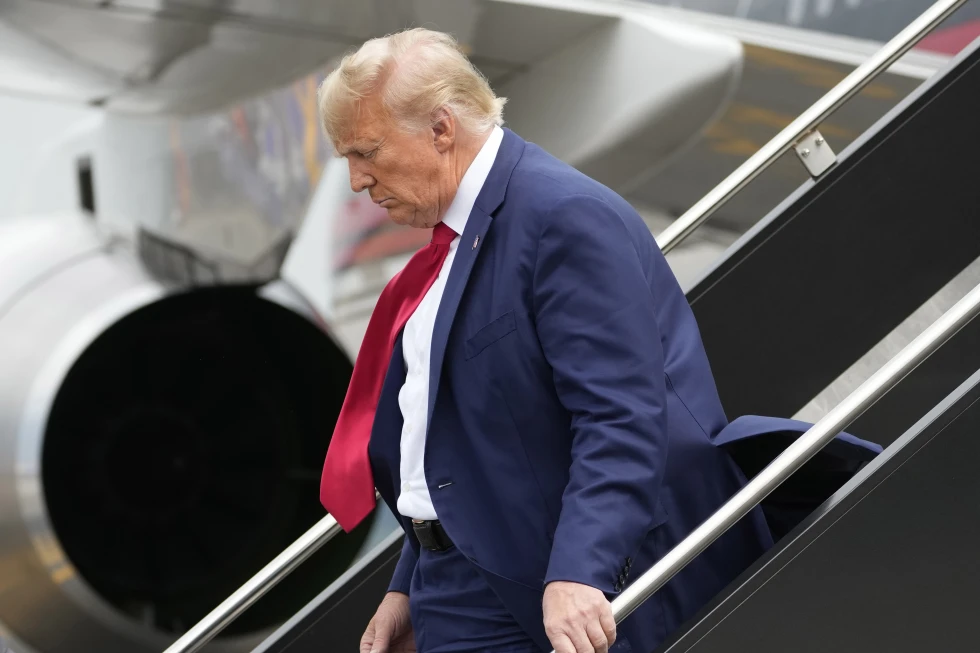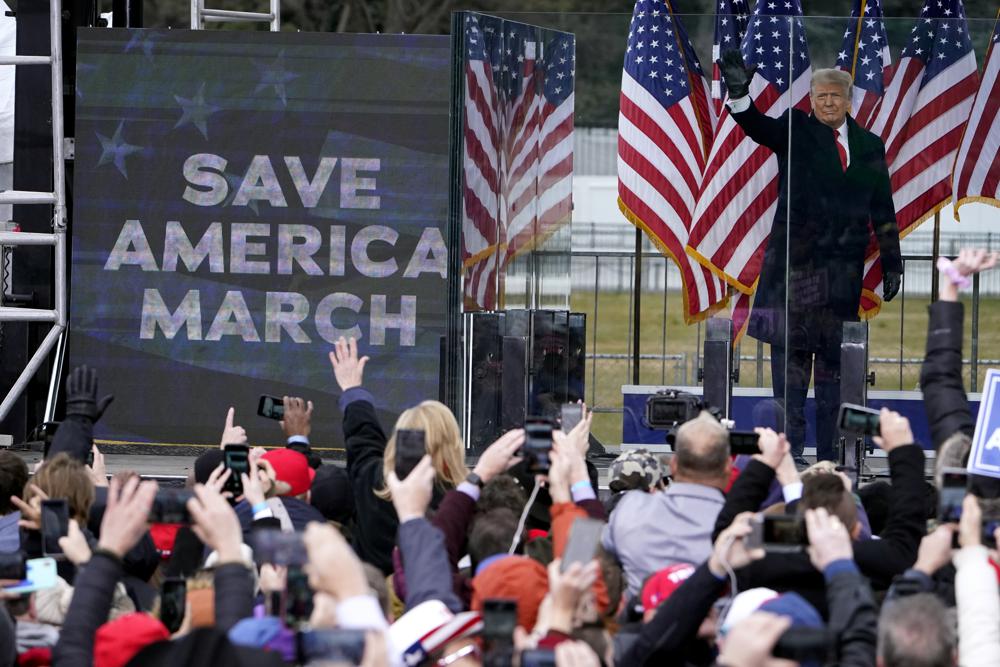Judge sets date for Donald Trump trial to begin the day before Alabama presidential primary

Alabama voters will go to vote for their choice for President of the United States on March 5. The leading Republican contender, former President Donald Trump, will be in court for his criminal trial that begins on March 4. The judge in former President Trump’s Jan. 6-related federal court case announced Monday that jury selection will begin on March 4. U.S. District Judge Tanya Chutkan declared that a trial date “cannot and should not” depend on the timetable of a defendant’s work life. Special counsel Jack Smith had wanted the trial to begin in January. Trump’s defense team had asked that, under the circumstances, the trial should be postponed until 2026. Judge Chutkan rejected that request and instead set the March 4 date – the day before the Super Tuesday primaries, which will likely determine the nominees for both major parties. Trump accused Chukan of being a “biased Trump Hating judge” who set a trial date that was “just what our corrupt government wanted.” Fulton County Prosecutor Fani Willis had asked the Chutkan to set the trial to begin on that same date. Trump faces four separate trials for 99 different indictments. This trial in federal court has to deal with his actions on January 6, 2021. Did President Trump’s efforts to overturn the Electoral College results constitute an insurrection, and did he act illegally? The Fourteenth Amendment to the Constitution specifically bars persons who participated in an insurrection from serving in federal office. This has to do with former members of the Confederate States of America who had taken up arms against the U.S.A. Some scholars argue that January 6 did constitute an insurrection, and this provision would apply. Former Arkansas Governor Asa Hutchinson made that argument during the first Republican Presidential Debate. Trump also faces a trial in Georgia where prosecutors claim that he and 18 associates were involved in an illegal conspiracy to overturn Georgia’s presidential election results. Trump also faces federal charges stemming from his alleged mishandling of classified documents found in his home in Mar-A-Lago, Florida. Classified documents were also found in Joe Biden’s Delaware home and Mike Pence’s home, and the issue of classified material by former Secretary of State Hillary Clinton. None of those people were ever charged with any crimes. Trump and his campaign are also charged with election fraud in New York City related to alleged payouts to former porn star Stormy Daniels and other women for silence about alleged illicit liaisons before Trump first ran in 2016. Trump is the first former President in the history of the United States to be indicted for a crime. At present, he faces the prospect of four separate criminal trials on up to 99 different individual counts. Additionally, he has codefendants who have been charged in each of these four rounds of indictments. Potentially, all four of these trials could take place at separate points during the coming election year. There is no evidence that all of the charges and allegations have hurt Trump in the polls. Trump remains extremely popular with Republican primary voters, but the legal jeopardy he faces have made some legal scholars question whether or not he can actually be the nominee. How the legal drama will influence voters is an unknown, given the nation has never experienced a presidential campaign like this. Many argue that some of these charges could have been brought before now. That prosecutors waited until Trump was a declared 2024 presidential candidate and then sought criminal trials amid the already established campaign calendar has led some Republicans to charge that Democrats have weaponized the courts against Trump. To connect with the author of this story or to comment, email brandonmreporter@gmail.com.
Donald Trump’s lawyers say proposed protective order is too broad, urge judge to impose more limited rules

Donald Trump’s legal team on Monday urged the judge overseeing the election conspiracy case against the former president to reject prosecutors’ proposed protective order concerning evidence in the case, saying it is overly broad and restrictive of his First Amendment rights. Lawyers for the early 2024 Republican presidential primary front-runner said the judge should impose a more limited protective order that would prevent the public disclosure of only materials deemed “sensitive” — such as grand jury documents — rather than all evidence handed over by the government in the case accusing Trump of conspiring to overturn his 2020 election loss. Trump’s lawyers, who have characterized the case as an attack on his right to free speech, told the judge that the need to protect sensitive information about the case “does not require a blanket gag order over all documents produced by the government.” “In a trial about First Amendment rights, the government seeks to restrict First Amendment rights,” Trump’s lawyers wrote. “Worse, it does so against its administration’s primary political opponent, during an election season in which the administration, prominent party members, and media allies have campaigned on the indictment and proliferated its false allegations.” The defense filing was in response to a request Friday from special counsel Jack Smith’s team for a protective order, which would impose rules on what Trump and his defense team can do with evidence handed over by the government as they prepare for trial in the case unsealed last week. Prosecutors’ proposed protective order seeks to prevent Trump and his lawyers from disclosing materials provided by the government to anyone other than people on his legal team, possible witnesses, the witnesses’ lawyers, or others approved by the court. It would put stricter limits on “sensitive materials,” which would include grand jury witness testimony and materials obtained through sealed search warrants. Under the government’s proposal, Trump could only be shown “sensitive” documents, not get copies himself. Protective orders aren’t unusual in criminal cases, but prosecutors said it was especially important in this case because Trump routinely takes to social media to discuss the legal cases against him. Protective orders aren’t unusual in criminal cases, but prosecutors said it was especially important in this case because Trump routinely takes to social media to discuss the legal cases against him. Prosecutors included a screenshot in their filing of a post from Trump’s Truth Social platform on Friday in which Trump wrote, in all capital letters, “If you go after me, I’m coming after you!” Trump has denied any wrongdoing in the case as well as another federal case brought by Smith that accuses Trump of illegally hoarding classified documents at his Mar-a-Lago estate in Palm Beach, Florida. A Trump spokesperson said the former president’s social media post “is the definition of political speech” and was made in response to “dishonest special interest groups and Super PACs.” Prosecutors said that they are ready to hand over a substantial amount of evidence to Trump’s legal team and that much of it includes sensitive and confidential information. Such information could include witness testimony from the grand jury that investigated the case, and those grand jury proceedings are secret. “If the defendant were to begin issuing public posts using details — or, for example, grand jury transcripts — obtained in discovery here, it could have a harmful chilling effect on witnesses or adversely affect the fair administration of justice in this case,” prosecutors wrote in their motion. Trump pleaded not guilty last week to four felony counts, including conspiracy to defraud the U.S. and conspiracy to obstruct Congress’ certification of Democrat Joe Biden’s electoral victory. The charges could lead to a lengthy prison sentence in the event of a conviction, with the most serious counts calling for up to 20 years. It’s the third criminal case brought this year against the early front-runner in the 2024 Republican presidential primary. But it’s the first case to try to hold him responsible for his efforts to remain in power during the chaotic weeks between his election loss and the attack by his supporters on the U.S. Capitol on Jan. 6, 2021. Smith also charged Trump in June with dozens of felony counts alleging the former president illegally kept classified records after he left the White House and obstructed government efforts to get them back. A new indictment recently unsealed in that case accuses Trump of scheming with Mar-a-Lago staffers to try to delete security footage sought by investigators. Magistrate Judge Bruce Reinhart imposed a similar protective order in June that prohibits Trump and his legal team from publicly disclosing evidence turned over to them by prosecutors without prior approval. Prosecutors are seeking another protective order in that case with more rules about the defense team’s handling of classified evidence. Trump has characterized all the cases against him as an effort to take down his 2024 campaign. His legal team has indicated that it will argue that he had relied on the advice of attorneys around him in 2020 and that the latest case is an attack on his right to free speech and his right to challenge an election that he believed had been stolen. Trump’s lawyers on Saturday asked for an extra three days to respond to prosecutors’ request for the protective order, saying they needed more time for discussion. But Judge Tanya Chutkan swiftly denied that request. Republished with the permission of The Associated Press.
Donald Trump pleads not guilty to federal charges that he tried to overturn the 2020 election

Donald Trump pleaded not guilty Thursday to trying to overturn the results of his 2020 election loss, answering for the first time to federal charges that accuse him of orchestrating a brazen and ultimately unsuccessful attempt to block the peaceful transfer of presidential power. The former president appeared before a magistrate judge in Washington’s federal courthouse two days after being indicted by Justice Department special counsel Jack Smith. Of the three criminal cases he’s facing, the most recent charges are especially historic since they focus on Trump’s efforts as president to subvert the will of voters and obstruct the certification of Democrat Joe Biden’s victory. His refusal to accept defeat and his lies about widespread election fraud helped fuel the violent riot on Jan. 6, 2021, when a mob of supporters stormed the U.S. Capitol. Trump, who is now the early front-runner in the 2024 Republican presidential primary, sat stern-faced with his hands folded, shaking his head at times as he conferred with an attorney and occasionally glancing around the courtroom as his court appearance began. He stood up to enter his “not guilty” plea, answered perfunctory questions from the judge, and thanked her at the conclusion of the arraignment. His appearance Thursday unfolded — as will the rest of the case — in a downtown courthouse between the Capitol and the White House and in a building where more than 1,000 of the Capitol rioters have been charged by the Justice Department, which last November appointed Smith to lead a probe into the role of Trump and his allies in the events of that day. The indictment charges Trump with four felony counts related to his efforts to undo his presidential election loss, including conspiracy to defraud the U.S. government and conspiracy to obstruct an official proceeding. The charges could lead to a lengthy prison sentence in the event of a conviction, with the most serious counts calling for up to 20 years. Smith himself attended the arraignment, sitting in the courtroom’s front row behind the prosecutors handling the case and about 20 feet away from Trump. He looked at times in Trump’s direction, though neither appeared to gesture at or talk to each other. U.S. Magistrate Judge Moxila Upadhyaya set the next court date for Aug. 28, when a tentative trial date will be set, and directed Trump not to communicate directly about the facts of case with any individual known to be a witness. Three police officers who defended the Capitol that day were also seen entering the courthouse. One of them, Aquilino Gonell, who retired from the Capitol Police after suffering injuries, took stock of the location’s symbolism, noting that it was “the same court in which hundreds of rioters have been sentenced. It’s the same court former President Trump is being arraigned in today for his alleged involvement before, during, and after the siege.” Trump has said he is innocent. His legal team has characterized the latest case as an attack on his right to free speech and his right to challenge an election that he believed had been stolen. He addressed the proceedings in a brief statement on a drizzly tarmac at Washington’s Reagan National Airport before he boarded his plane back to New Jersey. “This is the persecution of the person that’s leading by very, very substantial numbers in the Republican primary and leading Biden by a lot,” he said. “So if you can’t beat ‘em, you persecute ‘em, or you prosecute ’em. We can’t let this happen in America.” One early point of contention emerged Thursday when defense lawyers bristled at the idea that a trial could be rapidly scheduled. Prosecutors said they would move quickly to provide Trump’s lawyers with the information they’d need to prepare a defense, but defense attorney John Lauro said it was “somewhat absurd” that the case could be ready for trial anytime soon. “These are weighty issues. Obviously, the U.S. has had three years to investigate this matter,” Lauro said. The election theft case is part of escalating legal troubles for the ex-president, coming nearly two months after Trump pleaded not guilty to dozens of federal felony counts accusing him of hoarding classified documents at his Florida estate and thwarting government efforts to retrieve them. That case is set for trial next May. He also was charged in New York with falsifying business records in connection with a hush money payment to a porn actor during the 2016 presidential campaign, a case scheduled for trial next March. And prosecutors in Fulton County, Georgia, are expected in the coming weeks to announce charging decisions in an investigation into efforts to subvert election results in that state. Thursday’s arraignment was part of a now-familiar but nonetheless stunning ritual for Trump, requiring him to hit pause on his presidential campaign and play the role of criminal defendant. He was flown by private plane from New Jersey to Washington, where his motorcade with lights and sirens made its way through the nation’s capital — a journey documented in wall-to-wall cable coverage once again. His appearance represented a relatively rare return to Washington since he left the White House. After a trip that took him through a highway tunnel and District streets, Trump lamented what he called the “filth and the decay” of the city, which he claimed was worse than when he ended his term. But that overlooks the fact that when he left office, some businesses were boarded up, and military presence in the city was ramped up in the aftermath of the insurrection sparked by his own election lies. Federal and state election officials and Trump’s own attorney general have said there is no credible evidence the election was tainted. The former president’s allegations of fraud were also roundly rejected by courts, including by judges Trump appointed. The courtroom Thursday filled with spectators who included several federal judges, including Chief District Court Judge James Boasberg — presumably there to observe the momentous event. The indictment chronicles how Trump and his Republican allies, in what Smith described as an attack on a “bedrock
Court temporarily delays release of Donald Trump’s January 6 records

A federal appeals court on Thursday temporarily blocked the release of White House records sought by a U.S. House committee investigating the Jan. 6 insurrection, granting — for now — a request from former President Donald Trump. The administrative injunction issued by the U.S. Court of Appeals for the District of Columbia Circuit effectively bars until the end of this month the release of records that were to be turned over Friday. The appeals court set oral arguments in the case for Nov. 30. The stay gives the court time to consider arguments in a momentous clash between the former president, whose supporters stormed the Capitol on Jan. 6, and President Joe Biden and Congress, who have pushed for a thorough investigation of the riot. It delays the House committee from reviewing records that lawmakers say could shed light on the events leading up to the insurrection and Trump’s efforts to delegitimize an election he lost. The National Archives, which holds the documents, says they include call logs, handwritten notes, and a draft executive order on “election integrity.” Biden waived executive privilege on the documents. Trump then went to court, arguing that as a former president, he still had the right to exert privilege over the records, and releasing them would damage the presidency in the future. U.S. District Judge Tanya Chutkan on Tuesday rejected those arguments, noting in part, “Presidents are not kings, and Plaintiff is not President.” She again denied an emergency motion by Trump on Wednesday. In their emergency filing to the appeals court, Trump’s lawyers wrote that without a stay, Trump would “suffer irreparable harm through the effective denial of a constitutional and statutory right to be fully heard on a serious disagreement between the former and incumbent President.” The Nov. 30 arguments will take place before three judges nominated by Democratic presidents: Patricia Millett and Robert Wilkins, nominated by former President Barack Obama, and Ketanji Brown Jackson, an appointee of Biden. Given the case’s magnitude, whichever side loses before the circuit court is likely to eventually appeal to the U.S. Supreme Court. The White House on Thursday also notified a lawyer for Mark Meadows, Trump’s former chief of staff, that Biden would waive any executive privilege that would prevent Meadows from cooperating with the committee, according to a letter obtained by The Associated Press. The committee has subpoenaed Meadows and more than two dozen other people as part of its investigation. His lawyer, George Terwilliger, issued a statement in response saying Meadows “remains under the instructions of former President Trump to respect longstanding principles of executive privilege.” “It now appears the courts will have to resolve this conflict,” Terwilliger said. The committee late Thursday threatened to begin contempt proceedings against Meadows if he doesn’t change course and comply. “Simply put, there is no valid legal basis for Mr. Meadows’s continued resistance to the Select Committee’s subpoena,” the committee wrote to Terwilliger, saying it would view Meadows’ failure to turn over documents or appear at a scheduled deposition on Friday as “willful non-compliance.” The House has already referred former Trump adviser Steve Bannon to the Justice Department for potential criminal prosecution for contempt of Congress. Republished with the permission of the Associated Press.


